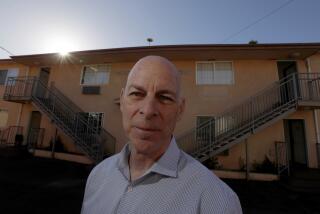Behind the $1.7-Million Buyout of Tuite : Politics: Sympathy for the CRA chief, confusion over how much the city was obligated to pay him and fear that the council would balk at the cost helped shape the secretive deal.
They paid Los Angeles redevelopment chief John Tuite a small fortune to get rid of him.
In the two weeks after the disclosure of Tuite’s $1.7-million retirement package, the richest ever received by a city official, the furor over the buyout has not died and important questions have remained unanswered.
Why did the Community Redevelopment Agency commissioners agree to pay so much to a bureaucrat who had fallen out of favor with the mayor’s office, the City Council, powerful business interests and neighborhood activists?
And why was the deal negotiated in such a secretive manner, bypassing the City Council committee set up to oversee the Community Redevelopment Agency’s activities?
Interviews with key city officials show that the commissioners’ decision was shaped by a variety of factors: their sympathy for Tuite; confusion over how much the city was legally obligated to pay him; the high price tag Tuite placed on his buyout, and fear that the council would balk at that price tag.
Tuite acknowledged Friday that his settlement was “significant enough” to cause legitimate public debate, but he accused council members of exploiting the controversy to strengthen their current bid to wrest control of the CRA from Mayor Tom Bradley.
“That’s the typical kind of hype that is designed to inflame the issue and drive everybody nuts,” Tuite said. “The furor has to do with the control the council would like to exert over the agency.”
Tuite, 57, a former Roman Catholic priest and federal housing official, had run Los Angeles’ $250-million-a-year redevelopment agency since 1986 and oversaw the ongoing revitalization of the Central City. But he and the agency were heavily criticized this last year for failing to provide enough affordable housing.
By last fall, even some of Tuite’s supporters at the agency had come to believe that the job had become too much for him.
“He was absent quite a bit of the time,” Commissioner Frank Kuwahara said. “He was not as visible as he was in the very beginning.”
“He had stopped showing up at important meetings and was paying less attention to agency business,” said another agency official who spoke on condition of anonymity.
Even Tuite conceded at the time of the buyout that the embattled agency needed someone else in charge. “It was certainly time to turn my attention to other things,” he said the day his retirement package was approved. “Certainly, the political climate sometimes calls for a change.”
But in buying out the 18 months remaining on Tuite’s contract, commission members were determined that he not be made the scapegoat for the agency’s problems.
“The general principle that guided us was . . . we wanted to be fair to John, (who) was not responsible for what we saw as the crisis of leadership,” said Jim Wood, the commission chairman.
Sources said Tuite set such a high price on his departure that CRA commission members kept the public in the dark until the deal was done. The sources said the commission wanted to avoid a lengthy council debate that might have postponed Tuite’s departure.
“It was a no-win situation,” said a commission member who asked to remain anonymous. “You either go along with the buyout then and there, or you’re stuck with a person who will stay and not put their heart into the situation.”
The commissioner said that several colleagues had come to believe three things the day they approved Tuite’s compensation: that the City Council might well balk at the terms, that Tuite would accept nothing less and that there was a pressing need for a new administrator.
Summing up the commission’s frame of mind before the Dec. 28 vote, Kuwahara said last week that Tuite’s buyout package was worth it “even though it’s expensive, if we can get the whole machinery back to working right.”
Yet at least one commissioner mistakenly believed that Tuite’s 1988 contract dictated the terms of the buyout.
“We didn’t think we had any latitude at all,” said Kuwahara. “As we discussed it, many said it was required by the terms of the contract, (and) there’s nothing we can do about it. As a general rule, that’s the feeling that we had.”
Wood disagreed, insisting it was clear that a big part of the deal was “discretionary” and not required by Tuite’s contract.
Under his contract, Tuite was entitled to a minimum of $508,940 in severance payments and pension benefits, according to an analysis done by a City Council analyst. That package would have cost the CRA $332,940.
With “discretionary” elements, the potential payments to Tuite soared to $1.7 million over a 30-year period.
CRA officials have said the price tag was $765,000, but City Hall analysts put the cost at more than $900,000.
The buyout package included two pay raises previously authorized by the commission but not yet reviewed by the City Council.
The mayor has said he was unaware of the total cost. But a spokesman last week acknowledged that Bradley had given the nod to a buyout that would cost in the range of $400,000 to $450,000.
Numerous city officials said the buyout was carried out behind their backs. Tuite took exception, saying that the biggest item in the buyout agreement--the increase in his pension--had been approved by CRA commissioners and made available for City Council review over the last two years.
“They knew what the issues were,” he said. “They could have acted on them at any time. They didn’t.”
Over the last several years, the CRA--the city’s chief agent of economic revitalization--has been assailed from many quarters. Advocates for the poor say the agency devotes too much money subsidizing skyscrapers. Neighborhood associations say the CRA uses its condemnation powers to run roughshod over small property owners. Major real estate developers say CRA bureaucracy delays their projects.
Criticism of the CRA became an issue in Mayor Bradley’s last reelection campaign. When the mayor’s office proposed to divert $2 billion in CRA revenues from downtown renovation to low-income housing, sources said, Deputy Mayor Mark Fabiani clashed with Tuite over the merits of the proposal.
Tuite’s combative response to an often-hostile City Council oversight committee further undermined his stature with Fabiani and other city officials.
“Tuite was front and center in the agency’s failure to deal effectively with the council,” said a ranking city official who has been working to resolve tension between the CRA and City Hall.
Faith in Tuite’s leadership eroded further last summer when CRA officials bungled the long-awaited redevelopment of Watts, which stalled after CRA officials made it sound as though thousands of homes would be condemned.
“I think Watts was the turning point . . . people really started to reassess his leadership after that,” said one City Hall official familiar with Tuite’s troubles.
On the heels of the Watts disappointment, an attempt by Tuite to rescue his own flagging reputation ended in acute embarrassment. His hiring of a public relations firm to brighten his public image triggered an investigation by the mayor’s office into charges that Tuite was improperly using agency money for his own benefit.
Tuite was exonerated. But the affair left a sour taste all around.
“To some degree, the entire episode while he was clearing himself was a complete diversion,” Wood said. “That it affected us adversely is a fact.”
Tuite has agreed to stay at his post until April. By then the mayor hopes to have found a replacement and to have quieted the storm over Tuite’s buyout. To pacify the critics, City Councilman Ricard Alatorre, a Bradley ally, proposed a series of reforms Friday that would tighten the council’s control over the CRA’s budget and the selection of Tuite’s successor.
Bradley, who now appoints CRA commissioners, hopes to avoid a possible takeover of the powerful agency by the City Council, which begins hearings on the issue Monday.
But the Tuite buyout has given new life to CRA critics who want to shift power away from the mayor.
“This whole Tuite buyout affair could prove very costly to the mayor,” said an aide to Bradley.
More to Read
Sign up for Essential California
The most important California stories and recommendations in your inbox every morning.
You may occasionally receive promotional content from the Los Angeles Times.










